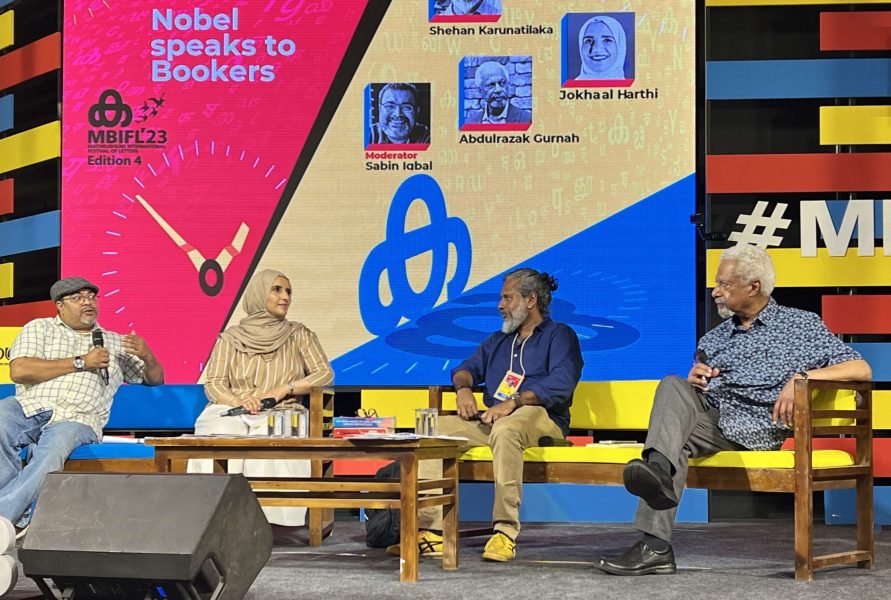
Mathrubhumi lit fest: In Kerala, a literature event seeks light of ideas for future

The fourth edition of Mathrubhumi International Festival of Letters (MBIFL), held at Kanakakunnu Palace in Thiruvananthapuram, was a smorgasbord of ideas, and an exuberant celebration of the written word. The festival, which concluded on Sunday, saw writers, actors and politicians reflect on the shape of arts and literature, and the state of the nation and the world.
In line with the festival’s 2023 theme, “Shadows of history; Lights of the future,” the sessions saw speakers, including 2021 Nobel Prize winner Abdulrazak Gurnah and 2022 Booker awardee Shehan Karunatilka, hold forth on their journeys, crafts, creative processes, the worlds their works spring from and their preoccupations as writers.
Founded in 1923 by K. P. Kesava Menon, Mathrubhumi (motherland in English) is one of Kerala’s most widely read newspapers. Since the group is also celebrating its centenary this year, the festival’s latest edition, held on ground after the two-year hiatus enforced by the pandemic, was conceived by festival director Mayura M.S. and curators Sabin Iqbal and Surendran MP as a ‘contemplative platform’ to examine the shadows of past learnings and, at the same time, seek the illumination of ideas and perspectives in the spheres of literature, arts and culture, politics, technology, science, society, and gender.
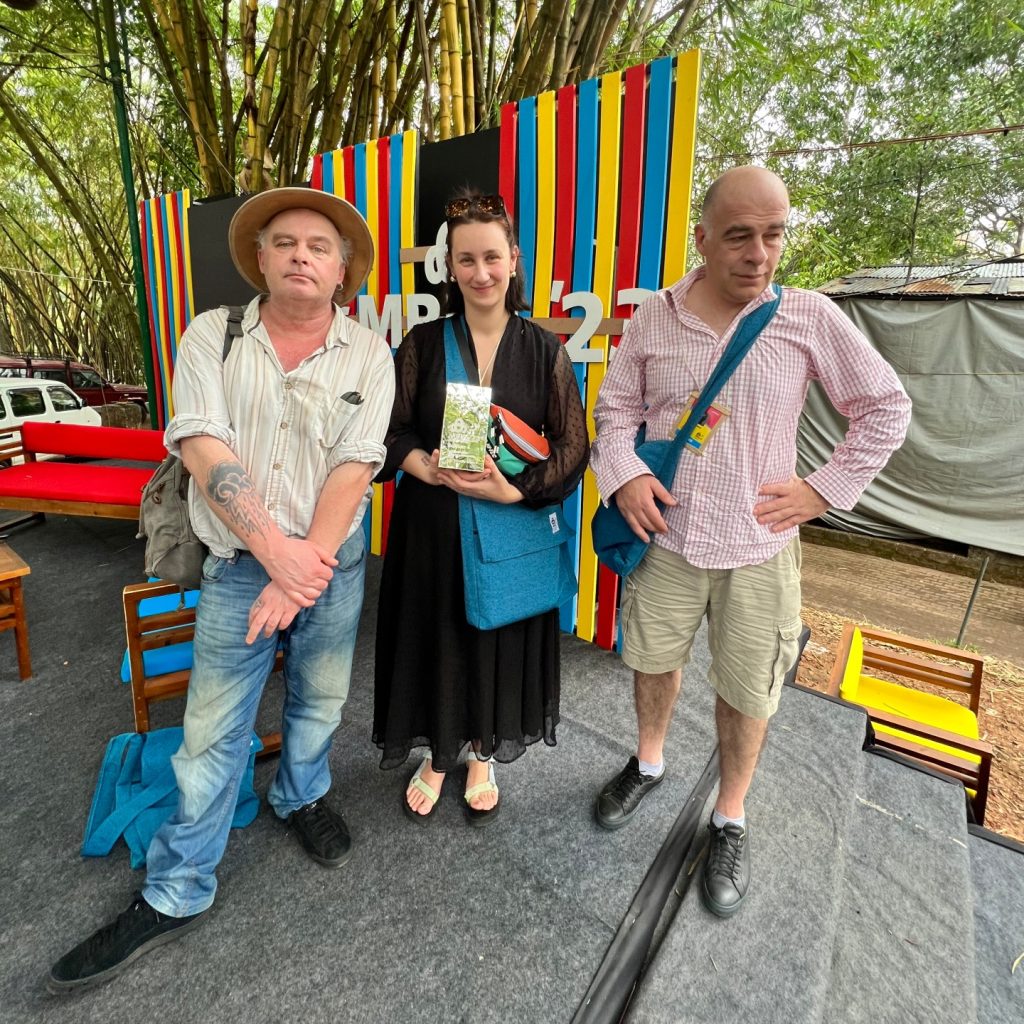
MBIFL’s first edition was held in 2018; spread over three days, it featured over 100 Indian and international speakers from over 10 countries. This year, it was organised on a bigger scale: the 250-odd sessions were spread over four days and included solo lectures and speeches, dialogues, discussions as well as readings of poetry and prose by more than 500 speakers. Also, this was the first time the fest was made a ticketed event to filter the discerning audience, Mathrubhumi Managing Director MV Shreyams Kumar said.
Memory of departure, enigma of arrival
Gurnah’s first novel, Memory of Departure (1987) — which explores the themes of identity, memory, belonging and exile — lent the festival the kernel of its theme. Having completed it around 1973, Gurnah had found a publisher after a 12-year-long struggle. One of the venues of the festival, Hall of Letters, had a text installation that outlined the MBIFL’s motif this year. It began with a paragraph from Gurnah’s novel, the story of an Arab teenager, Hassan Omar, whose dream to escape the violence and poverty of his small village in post-Independent East Africa is belied: “The shadows that I passed moved and flickered, staring. In the pallid glow of the lamps, the world seemed like a plain of rubble and boulders on the sea-bed — not the real world. As I walked past empty garage yards and locked-up warehouses it seemed as if I was strolling round the abandoned campfires of a great host… a place that had been arbitrarily and expediently picked for a bivouac on the road to other places.”

Also read: 75 years after Gandhiji’s killing, what his biographies reveal about his political, spiritual life
Underlining George Orwell’s maxim (“Who controls the past controls the future. Who controls the present controls the past”) in his 1949 dystopian novel 1984, the curatorial note read: “In the global context of socio-cultural and political shifts, irrespective of geopolitical history and narrative, the world is grappling with a hyphenated identity of history and future, of shadows and lights. It is, in many ways, the memory of departure that drives the journey forward. The shadows of history guide us toward the lights of the future. The memories give us the energy, the adrenalin to surge, to achieve, to discover, to conquer, and to find our own purple patch of light.”
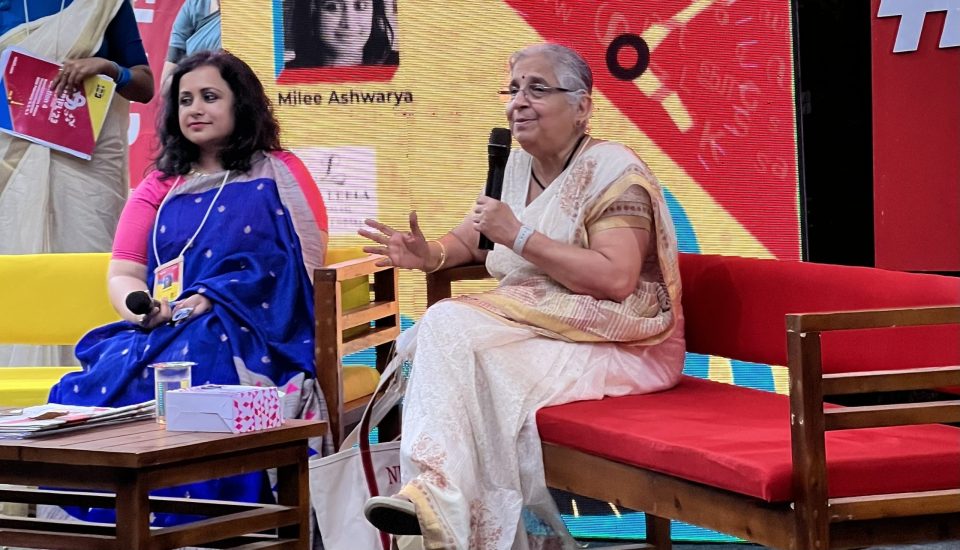
“The ‘shadows’ are one’s own identity, both singular and plural, and the journey is either redeeming the lost or redefining the blurred. It is calibrating and recalibrating the footprint, the mooring, and the image of who you are, toward the iridescent lights. Like animals moult in order to survive, we often leave behind the shadows of the past, going through a painful passage of time before the healing touch of light falls on us; before a skin grows to protect the vulnerabilities. Every new idea to solve today’s problem is guided or necessitated by the shadows of the past — the experience, the learnings, and the realities,” the curators’ note further read.
The idea of India
In his keynote address on Thursday (February 2), veteran Jnanpith-winning author, screenwriter and filmmaker MT Vasudevan Nair reflecting on the state of nation and striking a note of caution for writers and intellectuals, warning them to stay alert so that what happened in Nazi Germany between 1933 and 1945 does not happen in India.
They must, he urged, continue their creative pursuits in the face of serious and sinister assaults on freedom of expression and dissenting voices: “Pushed to the wall, Tamil writer Perumal Murugan once went to the extent of saying that he was giving up writing. But I would say writers should stand up instead of giving in to forces of suppression and remaining silent,” he stressed.
Also read: ‘Age of Vice’ review: A compulsive thriller spun around chasms of class
“We are living in times when freedom of expression in India is confronted with challenges arising from intolerance and violence. There are concerted efforts to suppress independent voices. What now appears the initial signals could lead to serious consequences later if we choose to remain silent,” said the Malayalam’s literary legend, who is popularly known as MT.
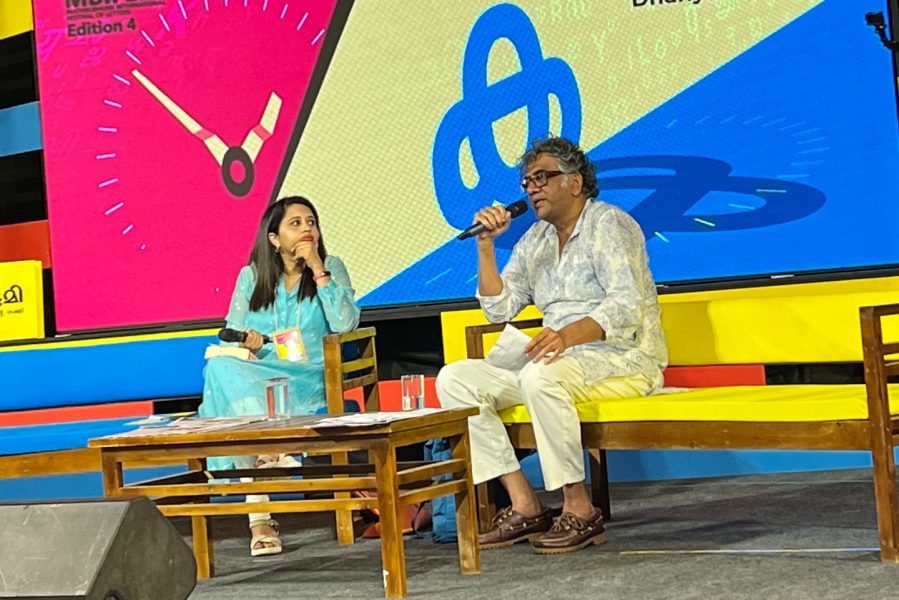
A clutch of other speakers took the conversation around the country forward over the next three days. They included Aakar Patel, Sitaram Yechuri, Shashi Tharoor, Mahua Moitra, Prakash Raj and Tamil Nadu Finance Minister Palanivel Thiagarajan. Speaking on the price of the years under PM Narendra Modi, Aakar Patel highlighted the plight of the minorities since 2014 and the Modi regime’s systemic attempts to invisibilise them. Both Patel and Raj underlined that there was a calculated attempt by the government to silence dissent, with the former adding that Modi had faced pushback from the civil society, which became evident in his failure to enact farm laws and implement the Citizenship Amendment Act (CAA).
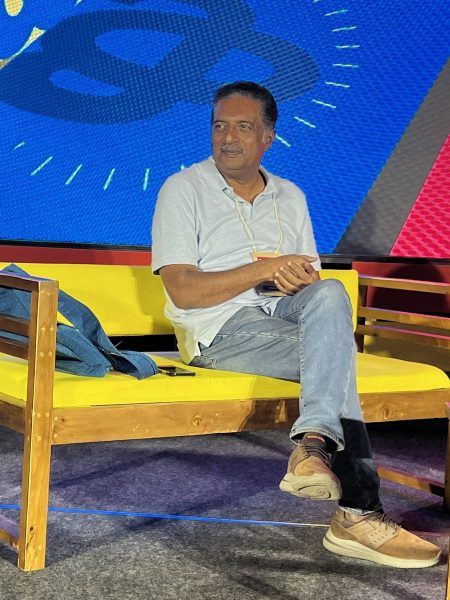
Speaking on how the Left politics shapes India’s democracy under the ‘Reimagining India’ segment, CPI-M General Secretary Sitaram Yechury said that as the basic tenets of the Indian Constitution are facing assault by the Modi government, the immediate task before the Left was to defend the ‘idea of India’ as a secular-democratic republic that guarantees rights, justice and liberty to all people.
The pillars of democracy and the fundamental ideas enshrined in the Constitution like equality, liberty and fraternity along with social justice are being destroyed systematically by the present regime by consistently building a false consciousness, he told the “Reimagining India’ segment of the four-day festival. “The urgent task is to at least go back immediately to ensure what is laid down in the Constitution is preserved so that we could build the future,” the CPI(M) leader said.

Star attractions and writers of the world
While Karunatilaka and Gurnah were the star attractions, the festival also featured a galaxy of speakers like Mallika Sarabhai, Divya Dutta, Kabir Bedi, TM Krishna, Pritish Nandy, Amitav Ghosh, Sudha Murthy, Shobhaa De and many others. Mexican author Mateo García Elizondo, the grandson of Colombian legend Gabriel García Marquez, garnered a lot of attention; this, to many, was not surprising since Marquez has been a huge favourite of the Malayalis, with the running joke being that Marquez has always been seen in Kerala as a writer of the soil.
Elizondo, who came to understand Gabo better after he read Hundred Years of Solitude, told The Federal that being the grandson of Marquez was both a blessing and a curse. A writer and a filmmaker, he has been trying to carve out his own identity, but the shadows of the legend hardly ever leaves him. Among performers, Carnatic vocalist Bombay Jayashri made the festival an unforgettable affair for the musically inclined.
A literature festival fosters love for reading, providing readers an interface with writers. MBIFL 2023, where writers from several corners of the world — including Europe, Africa and Poland — milled about for days, was a testimony to the fact that literature brings people together: it helps them grapple with the past and carve out a luminous future.

